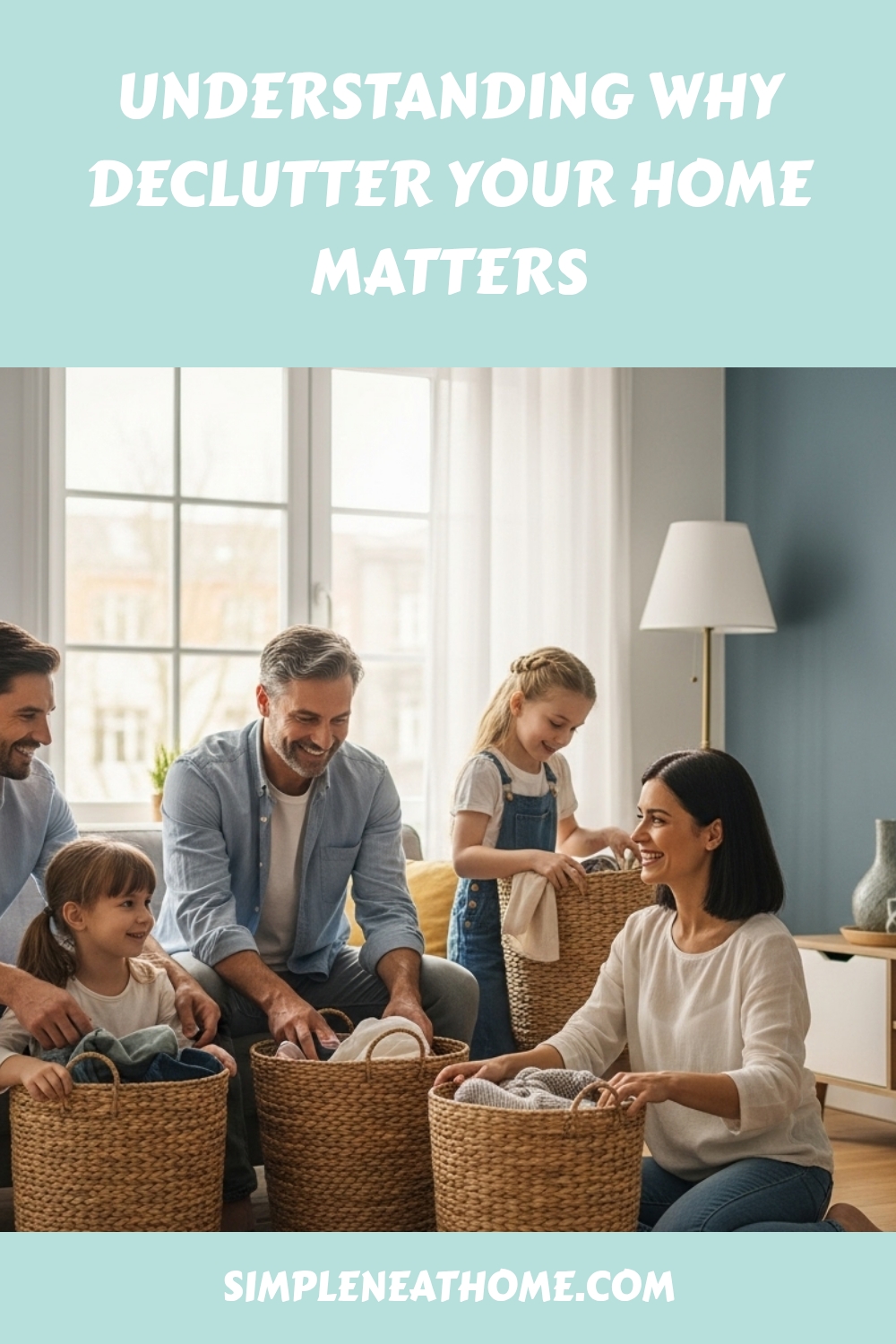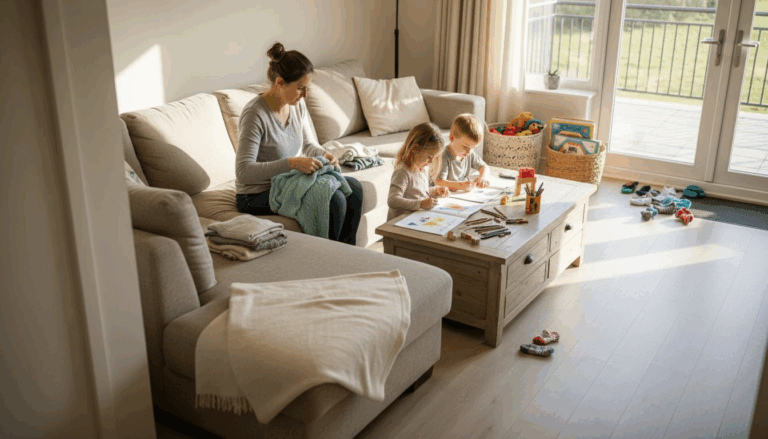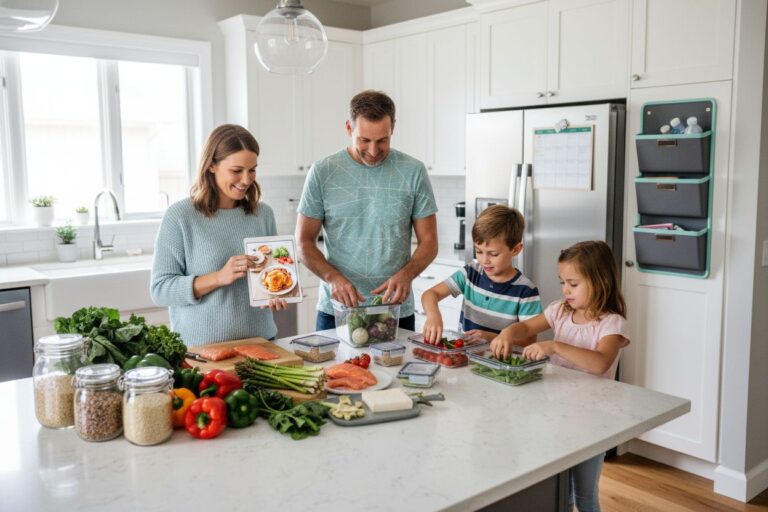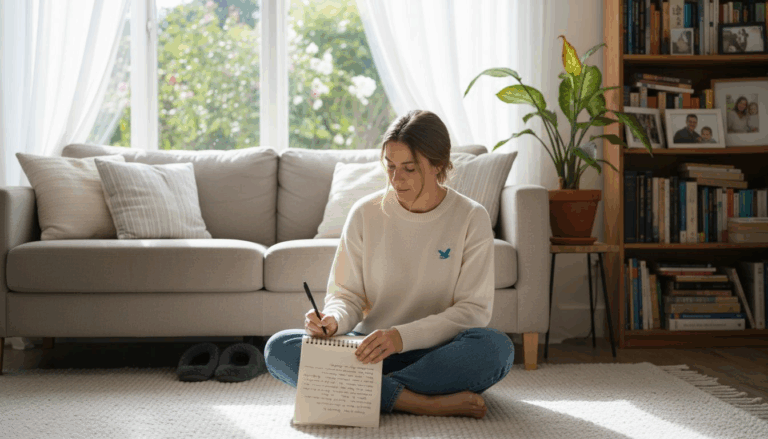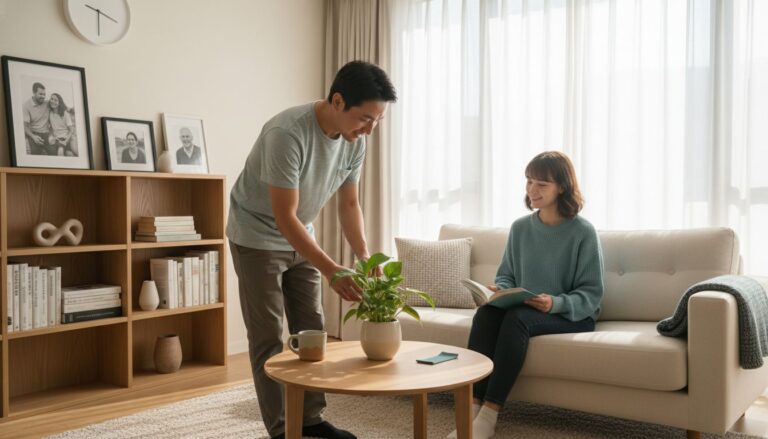Understanding Why Declutter Your Home Matters
Decluttering sounds simple, like just clearing away stuff you do not need. But get this. The average American home holds over 300,000 items and most people do not even remember what half of those are. So while you might think tidying up is just about keeping things neat, scientific research shows it goes much deeper. Letting go of excess clutter actually improves mental clarity, lowers stress, and even helps you make smarter decisions about what stays in your life and what goes.
Table of Contents
- What Is Decluttering And Its Purpose?
- The Psychological Benefits Of A Clutter-Free Space
- How Decluttering Impacts Daily Life And Productivity
- Environmental And Financial Aspects Of A Decluttered Home
- Key Concepts In Maintaining A Clutter-Free Environment
Quick Summary
| Takeaway | Explanation |
|---|---|
| Decluttering creates mental clarity and reduces stress. | Organizing your space decreases cognitive overload, enhancing focus and lowering anxiety, promoting mental well-being. |
| Mindful ownership increases emotional well-being. | Regularly assessing your belongings fosters personal growth and encourages emotional healing by letting go of unneeded items. |
| Implement the ‘one in, one out’ rule. | For every new item, remove an old one to prevent clutter, fostering mindful purchasing and maintaining an organized space. |
| Decluttering benefits productivity and efficiency. | An organized environment minimizes distractions, leading to quicker decision-making and improved task completion rates |
. |
| Decluttering supports environmental sustainability. | Reducing unnecessary possessions minimizes waste and promotes more conscious consumption, contributing to sustainability efforts.
What is Decluttering and Its Purpose?
Decluttering is more than just tidying up your living space. It is a deliberate process of systematically removing unnecessary items and organizing your environment to create a sense of calm and functionality. When you declutter, you’re not just moving things around you’re making intentional decisions about what truly matters in your personal space.
Understanding the Core Concept
At its heart, decluttering is about intentional living. It involves critically examining your possessions and keeping only those items that serve a genuine purpose or bring meaningful joy. Our guide on understanding ways to reduce household clutter can help you dive deeper into this transformative process.
According to research published in the Journal of Environmental Psychology, decluttering is directly linked to improved psychological well-being. The study reveals that individuals who maintain organized spaces experience:
- Reduced stress levels
- Enhanced mental clarity
- Increased productivity
- Better emotional regulation
Why Decluttering Matters
Beyond aesthetic appeal, decluttering serves profound psychological and practical functions. By minimizing physical chaos, you create mental space for creativity, focus, and personal growth. It’s not about creating a sterile environment but about curating a space that genuinely supports your lifestyle and personal goals.
Physical spaces reflect our internal states. A cluttered room often indicates a cluttered mind. When you systematically remove unnecessary items, you’re not just cleaning you’re creating room for new opportunities, experiences, and personal transformation. The process of decluttering becomes a powerful metaphor for letting go of what no longer serves you and making space for what truly matters.
The Psychological Benefits of a Clutter-Free Space
A clutter-free environment does far more than create visual appeal. It acts as a powerful catalyst for mental health, emotional well-being, and personal productivity. Your physical surroundings directly influence your psychological state, making decluttering a profound tool for personal transformation.
Mental Clarity and Stress Reduction
Clutter creates cognitive overload. When your space is crowded with unnecessary items, your brain constantly processes visual information, leading to mental fatigue and increased stress levels. Discover more about managing household clutter efficiently to understand this complex relationship between space and mental state.
According to research from Princeton University’s Neuroscience Institute, visual stimuli compete for neural representation in our brain. This means that physical clutter competes for your mental attention, reducing cognitive performance and increasing stress.

Key psychological impacts of a cluttered environment include:
- Increased anxiety levels
- Reduced concentration and focus
- Decreased ability to process information quickly
- Higher likelihood of feeling overwhelmed
Emotional Well-being and Personal Growth
A clean, organized space serves as a reflection of your inner emotional landscape. By systematically removing unnecessary items, you create room not just physically but metaphorically for personal growth, creativity, and emotional healing. The act of decluttering becomes a powerful form of self-care, helping you let go of emotional baggage represented by physical possessions.

When you intentionally curate your living space, you send a powerful message to yourself about self-respect, boundaries, and personal value. Each item you choose to keep or remove becomes a conscious decision about what truly matters in your life, transforming decluttering from a mere organizational task into a profound journey of self-discovery and emotional liberation.
Below is a comparison table outlining how decluttering positively impacts different areas of your well-being, as discussed in the article.
| Area Impacted | Effects of Decluttering |
|---|---|
| Mental Health | Reduces cognitive overload and stress, increases clarity |
| Emotional Well-being | Encourages personal growth, self-care, and emotional healing |
| Productivity | Minimizes distractions, speeds decision making, improves task completion |
| Financial Health | Lowers unnecessary purchases and storage costs, may create income by selling unused items |
| Environmental Sustainability | Reduces waste, promotes intentional and conscious consumption |
How Decluttering Impacts Daily Life and Productivity
Decluttering transcends mere organization. It fundamentally transforms how you navigate daily responsibilities, manage time, and approach personal and professional challenges. The ripple effects of a well-organized space extend far beyond aesthetic appeal, directly influencing your ability to perform and thrive.
Time Management and Efficiency
Clutter acts like an invisible productivity tax, consuming mental and physical energy that could be directed toward meaningful tasks. When your environment is disorganized, you spend significant time searching for items, navigating through unnecessary objects, and managing visual chaos. Learn practical strategies for kitchen organization to understand how targeted decluttering can reclaim your time.
According to research from Princeton University’s Neuroscience Institute, a cluttered environment significantly reduces cognitive performance. The study reveals that physical disorder competes for your brain’s attention, diminishing your capacity to focus and process information efficiently.
Key productivity impacts of an organized space include:
- Faster decision making
- Reduced mental fatigue
- Improved task completion rates
- Enhanced ability to prioritize effectively
Professional and Personal Performance
A decluttered environment serves as a powerful catalyst for peak performance. By minimizing physical distractions, you create mental bandwidth for creativity, strategic thinking, and problem solving. The discipline required to maintain an organized space translates directly into professional skills like systematic thinking, attention to detail, and efficient workflow management.
Beyond professional benefits, decluttering positively impacts personal relationships and self perception. A well organized space communicates intentionality, self respect, and emotional intelligence. It signals to yourself and others that you value order, clarity, and purposeful living. Each cleared surface and organized drawer becomes a small victory, building momentum toward larger personal and professional achievements.
This table summarizes key research-backed psychological and productivity impacts that result from maintaining a clutter-free environment, as referenced in the article.
| Impact Area | Effect of a Cluttered Space | Effect of a Decluttered Space |
|---|---|---|
| Stress Levels | Increased, leading to anxiety and mental fatigue | Lowered, creating a sense of calm |
| Focus and Concentration | Disrupted by visual distraction and information overload | Enhanced, allowing better focus and quick decisions |
| Task Completion | Slower due to disorganization and lost time | Faster with improved ability to prioritize |
| Emotional State | More likely to feel overwhelmed and burdened | Supports personal growth and self-respect |
Environmental and Financial Aspects of a Decluttered Home
Decluttering is not just a personal organizational strategy it’s a powerful approach to sustainable living that intersects environmental responsibility and financial mindfulness. By consciously managing your possessions, you create positive ripple effects that extend far beyond your immediate living space.
The Economic Impact of Mindful Possession
Consumer behavior directly influences personal financial health. Cluttered spaces often lead to unnecessary purchases, with individuals buying items they already own but cannot locate. Explore key questions to help you make smarter decluttering decisions to transform your approach to consumption and ownership.
According to research from the Environmental Protection Agency, the average American generates approximately 4.9 pounds of waste daily. Decluttering becomes a critical strategy for reducing personal consumption and waste generation, offering both financial and environmental benefits.
Key economic advantages of systematic decluttering include:
- Reduced impulse purchasing
- Lower storage and maintenance costs
- Potential income from selling unused items
- Increased awareness of personal consumption patterns
Environmental Sustainability Through Conscious Consumption
Decluttering represents more than an organizational technique it’s a fundamental shift towards sustainable living. By critically evaluating possessions, you minimize waste, reduce resource consumption, and contribute to broader environmental conservation efforts. Each item you choose to donate, recycle, or responsibly dispose of represents a small but significant step towards reducing landfill waste and promoting circular economy principles.
The environmental benefits extend beyond waste reduction. When you declutter, you become more intentional about purchases, prioritizing quality over quantity. This approach not only saves money but also reduces the demand for mass produced goods, indirectly supporting more sustainable manufacturing practices and reducing the carbon footprint associated with constant production and disposal cycles.
Key Concepts in Maintaining a Clutter-Free Environment
Maintaining a clutter-free environment is an ongoing process that requires consistent effort, strategic thinking, and a proactive approach to personal space management. It goes beyond periodic cleaning, involving a holistic mindset that prioritizes intentionality, mindfulness, and continuous evaluation of your living and working spaces.
The One In One Out Rule
The foundational principle of sustainable decluttering is the “one in, one out” approach. Learn why September might be the perfect time to reset your home organization and implement this transformative strategy. This method requires that for every new item you bring into your space, another item must be removed. This practice creates a natural balance, preventing unnecessary accumulation and encouraging more deliberate purchasing decisions.
Key benefits of the one in, one out approach include:
- Preventing unnecessary item accumulation
- Creating more mindful purchasing habits
- Maintaining a balanced living space
- Reducing storage and maintenance costs
Continuous Evaluation and Mindful Ownership
Decluttering is not a one time event but a continuous journey of mindful ownership. Regularly assess your possessions, asking critical questions about their current utility, emotional significance, and alignment with your present lifestyle. This practice requires developing a nuanced relationship with your belongings, understanding that objects serve you, not the other way around.
By cultivating an environment of continuous evaluation, you transform decluttering from a periodic chore into a sustainable lifestyle practice. Each item in your space becomes a conscious choice, reflecting your current values, goals, and personal growth trajectory. This approach not only maintains physical order but also supports emotional well-being and personal development.
Ready to Experience the Life-Changing Benefits of Decluttering?
Feeling overwhelmed by constant clutter and mental fatigue? The challenges outlined in “Understanding Why Declutter Your Home Matters” are real: elevated stress, wasted time, and lost focus all stem from chaotic spaces. A clutter-free home means calmer mornings, improved productivity, and a renewed sense of control. Imagine the transformation when each room nurtures clarity and peace.
Frequently Asked Questions
What are the primary benefits of decluttering my home?
Decluttering your home leads to reduced stress levels, improved mental clarity, increased productivity, and enhanced emotional regulation. A clean environment can significantly boost your overall well-being.
How does decluttering impact my daily productivity?
A decluttered space enhances daily productivity by reducing mental fatigue and the time spent searching for items. It allows you to make quicker decisions and prioritize tasks more effectively, leading to better performance in both personal and professional spheres.
What is the ‘one in, one out’ rule for decluttering?
The ‘one in, one out’ rule is a strategy where for every new item you bring into your home, you remove one item. This practice helps maintain balance and prevents unnecessary accumulation of possessions, promoting mindful ownership.
How can decluttering improve my emotional well-being?
Decluttering can improve emotional well-being by creating a space that reflects your values and goals. It allows you to let go of emotional baggage tied to physical possessions, fostering personal growth and self-respect.
Recommended
- Why September is the Ideal Time to Declutter Your Home
- Understanding Ways to Reduce Household Clutter Effectively | Simple Neat Home
- 15 Things You Can Declutter From Your Kitchen RIGHT NOW
- How to Declutter When You Don’t Have Time | Simple Neat Home
